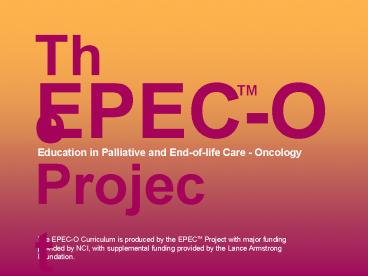Module 11 PowerPoint PPT Presentation
Title: Module 11
1
The
EPEC-O
TM
Education in Palliative and End-of-life Care -
Oncology
Project
The EPEC-O Curriculum is produced by the EPECTM
Project with major funding provided by NCI, with
supplemental funding provided by the Lance
Armstrong Foundation.
2
EPEC Oncology Education in Palliative and
End-of-life Care Oncology
- Module 3c
- Symptoms Anxiety
3
Anxiety
- A state of feeling apprehension, uncertainty or
fear - May lead to some level of dysfunction
4
Generalized anxiety disorder
- A state of excessive anxiety or worry
- Lasting 6 months
- Impacting day-to-day activities
5
Panic attack
- Sudden onset of intense terror, apprehension,
fearfulness, terror or felling of impending doom - Usually occurring with symptoms
- Shortness of breath Palpitations
- Chest discomfort Sense of choking
- Fear of going crazy or losing control
- Lasting 15 30 minutes
6
Prevalence
- Up to 21 of cancer patients
- Often no previous anxiety
- Often un- or under-diagnosed
- Many develop PTSD symptoms
7
Prognosis
- No specific implications
- Sequelae can limit prognosis
- Anorexia
- Insomnia
- Harmful behaviors
8
Key points
- Pathophysiology
- Assessment
- Management
9
Pathophysiology . . .
- Maladaptive neurotransmitter-based response to
stimuli, involving - Norepinephrine
- Serotonin
- GABA
- Modest genetic component
10
. . . Pathophysiology
- Anxiety can be generated by
- Symptoms
- Hypoxia
- Pain
- Sepsis
- Adverse reactions
- Akathisia
- Medication withdrawal
11
Assessment
- Detailed interview
- Do you worry a lot?
- Are you often fearful?
- Do you feel anxious?
- Tools
- Hospital Anxiety and Depression Scale
- Profile of Mood States
12
. . . Assessment
- Look for
- Insomnia
- Alcohol, caffeine
- Adverse effects of medications
- Medical conditions
- Delirium Depression
- Pain Metabolic states
- Withdrawal from alcohol, nicotine, opioids
13
Management
- Supportive counseling
- Complementary therapies
- Pharmacotherapy
- Combinations are best
14
Supportive counseling . . .
- Weave into routine care
- Include family when possible
- Improve understanding
- Create a different perspective
- Identify strengths, coping strategies
15
. . . Supportive counseling
- Re-establish self-worth
- New coping strategies
- Educate about modifiable factors
- Consult, refer to experts
16
Complementary therapies
- Muscle relaxation
- Massage
- Guided imagery
- Hypnosis
- Meditation
- Aromatherapy
- Avoid caffeine, alcohol
- Treat insomnia
17
Acute anxiety
- Benzodiazepines ideal for short term management
- Anxiolytics, muscle relaxants, amnestics,
- antiepileptics
- Contraindicated in elderly (amnesia)
- Choose base on half-life ( t½ )
- Never more than one at a time
- Taper slowly
18
Benzodiazepines . . .
- Longer t½ - sustained effect, may accumulate
- Clonazepam 30 40 hr
- Diazepam 0.83 2.25 days
- Shorter t½
- Lorazepam 12 hr (ideal)
- Alprazolam 11.2 hr (risk of rebound)
19
. . . Benzodiazepines
- Very short t½ (risk of rebound is high)
- Oxazepam 2.8 8.6 hr
- Triazolam 1.5 5.5 hr
- Ideal for procedures
- Midazolam 1.8 6.4 hr
20
Alternatives
- Gabapentin
- Trazodone
21
Chronic anxiety
- SSRIs
- Latency 24 weeks
- Well tolerated
- Once-daily dosing
- Start with lower doses in advanced illness,
titrate to therapeutic dose - Check for medication interactions
22
SSRIs
- Paroxetine
- Citalopram
- Escitalopram
23
Severe anxiety
- Start simultaneously
- Benzodiazepine
- SSRI
- Taper benzodiazepine once SSRI effective in 4 6
weeks - Consult a psychiatrist if therapy ineffective
24
Summary
- Use comprehensive assessment and
pathophysiology-based therapy to treat the cause
and improve the cancer experience

